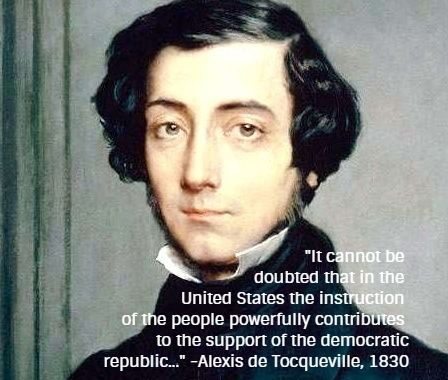The following is excerpted with permission from the book Our Ageless Constitution [p.51]
The Spirit That Enabled A People To Transform Their Ideas Of Liberty Into A New Concept Of Constitutional Government For A Free People
“…one must understand something of the spirit of the people who had been experimenting successfully with liberty for over 165 years when the Constitution was framed.”
From 1620, the settlers of America were motivated by a passion for liberty. British statesman Edmund Burke, in 1775, traced the astounding economic development and the unparalleled spirit of liberty of the Americans when he appealed to Parliament for conciliation with its colonies (See: Part VIII – Burke Speech on Conciliation). He said: “…it is the spirit that has made the country…
Examining some of the reasons for the spirit, he continued:
“Religion, always a principle of energy, in this new people is no way worn out or impaired; and their mode of professing it is also one main cause of this free spirit…. This is a persuasion not only favourable to liberty, but built upon it…. This religion, under a variety of denominations agreeing in nothing but in the communion of the spirit of liberty, is predominant in most of the northern provinces…. The Southern colonies are much more strongly and with a higher and more stubborn spirit attached to liberty than those to the northward.”
Burke’s comments shed remarkable light on the American spirit exhibiting itself, even to those in foreign lands, by the time of the American Revolution. His observations are significant for they reveal something important about a people already established in the eyes of the world as lovers of ordered liberty and participants in outstanding progress. Burke described what he called the “temper and character” of the people, saying, “In this character of the Americans a love of freedom is the predominating feature which marks and distinguishes the whole….” Among the reasons for their “untractable spirit,” he said, was their “education.”
“In other countries the people … judge of an ill principle in government only by an actual grievance; here they anticipate the evil and judge of the pressure of the grievance by the badness of the principle.”
In other words, Burke observed that in most of the world, people could only begin to understand an oppressive or bad idea in government after it had been employed to harm them. Americans were different, he said, for they were taught to understand the principles--ideas and principles inherent in human nature, both good and bad--before they could be used to oppress them. Possessing such understanding, he said, Americans could detect “misgovernment at a distance and snuff the approach of tyranny in every tainted breeze.” James Madison later expressed it this way:
“The freemen of America did not wait till usurped power had strengthened itself by exercise, and entangled the question in precedents. They saw all the consequences in the principle, and they avoided the consequences by denying the principle. We revere this lesson too much, soon to forget it.”
It is clear that Americans were educated in the ideas of liberty for several generations. As late as 1830, Frenchman Alexis de Tocqueville observed among the general population of America the same high degree of education and understanding of basic principles. “It cannot be doubted that in the United States the instruction of the people powerfully contributes to the support of the democratic republic….” Even in outlying areas, he said, the American “will inform you what his rights are and by what means he exercises them….”
Such understanding was the primary purpose of the education provided to early generations. As Thomas Jefferson stated:
“The most effectual [effective] means of preventing the perversion of power into tyranny are to illuminate …the minds of the people at large, and more especially to give them knowledge of those facts, which history exhibits, that possessed thereby of the experience of other ages and countries, they may be enabled to know ambition under all its shapes, and prompt to exert their natural powers to defeat its purposes.”
According to Jefferson, the people’s study of history would “qualify them as judges of the actions and designs of men; it will enable them to know ambition under every disguise it may assume; and knowing it to defeat its views.”
By 1787, after having endured a long and traumatic struggle for independence and freedom from a government that had become increasingly abusive and oppressive, their understanding of the nature of mankind as revealed through history and their examination of ideas and principles necessary to liberty had equipped them to undertake the establishment of a government for a free people – a government having its very foundation set in the knowledge that the rights and liberty of people are endowed by their Creator and are, therefore, unalienable.
With this concept and these principles firmly fixed in their minds, and with a “stubborn spirit attached to liberty” they were ready, in 1787, to prepare a Constitution for the United States of America.
